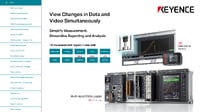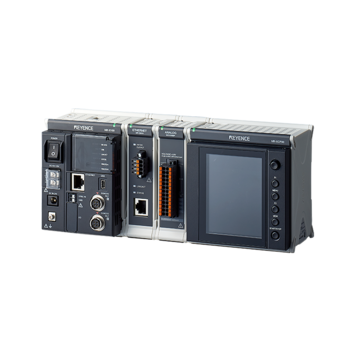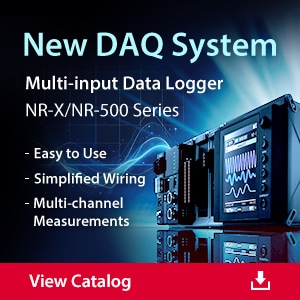Data Acquisition (DAQ)
8 Ways a Data Logger Can Save You Money
-
Tags:
- Data Acquisition
A business’s profitability is measured not only in its revenue but also in its cost savings and ROI (Return on Investment). As such, many companies are investing heavily in equipment and methodologies that increase their efficiency and ROI in the long run.
Data loggers, devices typically used to record various sensor data over time, process said data, and store it, often play a big role in enhancing long-term cost savings while increasing efficiency. In this guide, we’ll discuss how data loggers save money.
Without further ado, let’s dive into the various ways that data loggers can save you money.
Monitoring Energy Consumption and Optimizing Usage
Among the many data acquisition systems and data logger benefits in industrial settings is the ability to monitor energy consumption. When it is used and how it’s used. This can help businesses identify patterns and various inefficiencies in their operational processes to optimize energy use accordingly.
Based on this information, business managers can adjust the heating and cooling systems on various machinery, relocate work to other machines to fill their operational capacity, and turn off underutilized machines. Active energy savings not only lower the utility bill but also contribute to a more sustainable operation. Implementing these optimizations often leads to significant cost savings over time.
Ensuring Compliance with Regulations and Avoiding Fines
Ensuring compliance is another data logger benefit, as they help you save money since failure to comply with industry regulations often leads to hefty fines and penalties, financial or otherwise. These devices help ensure compliance by continuously monitoring and recording parameters required by regulatory bodies.
For example, the food industry demands strict temperature and humidity level monitoring in certain applications, especially in the storage and transport of food and other perishable goods. By maintaining accurate and verifiable records, businesses can prove compliance during audits and inspections, thus avoiding costly fines.
We’re here to provide you with more details.
Reach out today!

Preventing Equipment Downtime and Minimizing Maintenance Costs
Equipment downtime is incredibly costly for two reasons: the loss of productivity and emergency repair costs. Fortunately, data loggers excel at preventing both. These devices can record and store different parameters from different sources, and data analysis often provides early signs of potential equipment failure.
This is usually done through analysis of continuously monitored parameters, such as temperature, vibration, and pressure. Data loggers can record this data and notify the necessary personnel once the measure values exceed predefined thresholds. This helps prevent downtime by keeping maintenance teams and crew members apprised of various irregularities that could lead to an impending machine failure. It also helps management plan downtime for repairs, which is much less costly than unplanned downtime.
Moreover, data loggers allow a preventative maintenance approach for timely interventions. This reduces the frequency and severity of equipment failures and malfunctions while minimizing maintenance costs along the way.
Improving Process Efficiency and Reducing Waste
By providing real-time data analytics, data acquisition systems and data loggers can identify inefficiencies in various operational processes, allowing businesses to streamline operations and eliminate losses associated with a lack of optimization.
By analyzing the data collected and stored by data loggers, businesses can identify new optimizations and improvements to enhance process efficiency. This can increase output while also reducing resource consumption and waste, the latter of which often lead to substantial losses.
Discover more about this product.
Click here to book your demo.

Enhancing Product Quality and Minimizing Product Loss
Data loggers are often involved in quality assurance and quality control processes, which are important for maintaining product quality and customer satisfaction, as well as minimizing costly returns and recalls. So, in other words, monitoring quality at each step of the operational or manufacturing process is how data loggers save you money.
Defective products detected mid-production, as opposed to final inspection, are often sent to rework, reducing scrap costs. Those that make it to quality control never reach the customer. A good example is the pharmaceutical industry, which relies on data loggers to track environmental conditions to ensure that its products are stored at adequate temperatures.
Not only do data loggers ensure quality assurance and quality control, but they also ensure that the products are kept in optimal conditions, reducing the risk of product degradation and spoilage, thus minimizing product loss and ensuring consistent quality. However, this isn’t only associated with industries dealing with perishable goods but all industrial applications overall.
Remote Monitoring Capabilities and Reduced Labor Costs
Though they’re mostly used for localized measurements, some data acquisition systems (DAQs) come equipped with remote monitoring capabilities that allow businesses to track conditions and performances from any place at any time. This significantly reduces the need for manual inspections and on-site monitoring, allowing businesses to save costs and free up staff for other important tasks.
Remote monitoring is a particularly beneficial feature, especially for companies with several hard-to-reach locations. It eliminates the need for frequent travel and physical inspections while allowing businesses to maintain oversight and control without incurring additional operational costs.
Curious about our pricing?
Click here to find out more.

Long-Term Data Analysis Leading to Informed Decision-Making
Long-term data storage and analysis are essential, as they help derive information useful for strategic decision-making. By gathering and analyzing massive data sets, businesses can analyze and identify trends, forecast future conditions, and evaluate their effectiveness.
This provides them with plenty of information to make data-based and well-informed strategic decisions, mostly associated with investing in new technologies, optimizing resource allocations, or simply adjusting operational strategies for better financial outcomes.
Drive Efficiency and Cut Costs with Data Loggers
The aforementioned long-term data analysis helps businesses make informed decisions and optimize their operational processes. This leads to increased efficiency, adequate resource allocation and use, and significant cost reductions associated with less rework, less scrap, and a better optimized and managed workforce.
Reduced downtime and preventative maintenance provided by these optimizations also cut unnecessary costs, while enhanced product quality, remote monitoring, and better and more efficient data-driven decision-making allow businesses to cut down on costs and increase their profitability, further driving growth.
There are countless advantages of data loggers and other DAQ systems, such as those provided by KEYENCE, making them a viable choice for businesses looking to improve their bottom line. So, if you’re interested, give KEYENCE a call and inquire about the possible integration of our equipment with your existing manufacturing line.
Contact us to learn more about how our advanced technology can help take your business to the next level.
Contact Us



